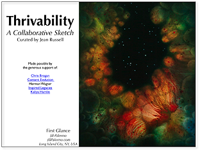“Exclusion” – my essay from the free ebook “Thrivability: A Collaborative Sketch”
 Last month at the SXSW Interactive Festival in Austin, I had the honor of helping my friend Jean Russell launch an exciting new ebook called Thrivability: A Collaborative Sketch.
Last month at the SXSW Interactive Festival in Austin, I had the honor of helping my friend Jean Russell launch an exciting new ebook called Thrivability: A Collaborative Sketch.
Inspired by Seth Godin’s collaborative ebook What Matters Now?, the book contains short essays and images by 63 big thinkers, each focusing on a word or short phrase that has to do with creating a more thrivable world. Contributors include some of my favorite thinkers, such as Clay Shirky, Beth Kanter, John Hagel, Kaliya Hamlin and Tony Deifell.
The book is available online as a slideshow, a PDF, and a website. Please give it a read. Share it via Twitter, Facebook, etc. And join the conversation.
Here is my own contribution, a meditation on the word “exclusion.” It appears on page 30 of the book. I’d love to hear your feedback.
Exclusion
Leif Utne, Zanby.com – Bainbridge Island, WA, USA
Ouch! Exclusion is such a harsh word. What place could it possibly have in a world that’s open, inclusive, and thrivable?
Like a hammer, exclusion is merely a tool. In its unhealthy forms, exclusion is used to oppress, to avoid accountability, circumvent democracy, and maintain established economic and political order. It brings to mind secret societies, smoky back rooms, nativism, and dehumanizing the “other.”
But exclusion can also be healthy and life-affirming. For individuals, that may mean choosing your conversations more wisely, lightening your load, de-cluttering your mental and physical space, eliminating distractions and focusing on what matters most. It means making space for solitude, contemplation, attention to yourself, to your breath, to nature, to being fully present.
Exclusion is not a choice of whether to exclude, or not, it is a choice of what to exclude.
For groups, healthy exclusion means creating safe containers in which to share and collaborate more deeply. It means being intentional about who and how many you want to share space with. It’s about creating and protecting sacred space. A good host has a talent for appropriate exclusion. It’s the social artistry of choosing who you want at the party, and who you don’t.
Every marketer knows that exclusion is a powerful tool. Done well, limiting access to a place, a group or a product makes it cool. Anyone who has launched a new online community can tell you that early on exclusion is vital — to set the tone and model the kind of interaction you want. It’s a way of establishing a new culture intentionally.
Exclusion can be about useful constraints, which spur creativity, whether you’re answering an essay question on a test or innovating new products. Imagine, for example, a candle. What is a candle without a wick? Without light? Without heat? Without wax? Such a thought experiment can help you identify which properties are intrinsic to something, and think creatively about novel ways to reproduce them.
Exclusion is part of evolution, particularly the conscious evolution we are living through now. It’s about casting off outmoded, destructive ways of thinking and being. And it’s absolutely essential to a thrivable future.
I’ve already gotten some great comments on this piece. One friend suggested “discernment” as an alternative to exclusion. I like that. It has much less of a negative charge to it. But that charge is part of why I find the term exclusion provocative. I like re-framing terms in ways that shift their charge.
Another friend suggested a different frame: pruning. For a tree to thrive, it takes pruning, which means making healthy choices about where to cut back so you can channel its growth in positive directions.
What do you think? Please share your thoughts in the comments below.


One of the many forms of exclusion can be found in Fazal Sheikh’s works. He’s a photographer I met on Martha’s Vineyard way back when and his books are a must in terms of beauty, simplicity and humanity. You can check him out on Google and his books are now free and available on line. They can also be bought on Amazon.com
A MUST !!!
Love,
Geneviève
Geneviève Bezoulle
April 8, 2010 at 2:53 am
Thanks for the tip, Genevieve. I’ll definitely check out Fazal’s stuff. xoxo, Leif
leifutne
April 8, 2010 at 9:28 am
Hi Leif,
Thanks for provoking the following reflections on exclusion; it’s so “up” in our extended-family just now.
Yes, to the west of my writing room here on Singing Farm, I’m looking at peach and pear trees that are indeed healthier and promising more fruit because they were radically pruned last year. Limbs in danger of breaking were removed to save the health of the tree, just like sometimes certain people aren’t invited to a gathering to preserve some image of what a good mix of folks will be.
Yet in human communities, when folks with certain kind of colorful personalities (and who might be called our “difficult person” in loving-kindness practices) are excluded, do we reduce the thrivabilty of the community to the same degree that we’re unable to grow collectively in the presence of emotions, behavior patterns, cultural habits that irk us?
oysters’
irritants
seed the birth of pearls
AND…As a woman who knows to power of creating women-only spaces to create the safety all-too-many women still need to be fully expressive, I deeply appreciate the power of positive exclusion.
Thank you again, for inspiring this thread of reflection. Discerning the difference between skillful and harmful uses of exclusion feels like a core capacity re thrivability.
Big hug,
rb
Rachel Bagby
April 8, 2010 at 6:29 am
ps – and thanks for inspiring yet another 10 poem. many more there that came from on twitter – @10poetry. hope to see you there soon. xo, rachel
Rachel Bagby
April 8, 2010 at 6:32 am
“oysters’
irritants
seed the birth of pearls”
I love it! Hope to see you again soon, too.
leifutne
April 8, 2010 at 9:29 am
I like the pruning analogy. I spent an entire day recently pruning one apple tree (mostly because I am out of practice, and because I was enjoying the meditation and practice of figuring out the puzzle of branches. Each cut is a choice for future growth, for fruit, for light and for stimulation of fruiting wood. One must have an understanding of the growth mechanism of the tree, and the response to each cut that will happen over the next few years. In order to make a good cut, one must also study the tree to see the history of the last few prunings and the growth that must now be cut, or excluded. At the end of the day, I had removed about 1/3 of the branches for the health of the tree and for next year’s fruit. This year it will bear less of the crunchy round Empire red apples than last year, but this practice of exclusion and pruning is all about longevity and the future.
Laura Leigh
April 9, 2010 at 7:49 am
Thanks,it’s really an interesting article. superb… for reading it, Nice article.
Marie Chelle
May 23, 2010 at 11:25 am
[…] and downloaded a book called Thrivability, which I’m currently reading. It’s found here. I also went on to download the book that inspired Thrivability. Its called What Matters Now, and […]
Tangent — Sassy Librarians « RAFrenzy
August 18, 2010 at 1:37 pm
Leif, you are such a wonderful thinking. Thank you for your contribution to”Thrivability: A Collaborative Sketch”. I have always enjoyed reading what you have to say, and this is no exception. Umm, exclusion?
… “It means being intentional about who and how many you want to share space with. It’s about creating and protecting sacred space. A good host has a talent for appropriate exclusion.” …
I agree with this on so many levels. It IS about creating and protecting sacred space.
For example, in an all-inclusive event, a simple request for someone take off their shoes, quiet their mind and still their voices before entering the sacred space deserves compliance. If they refuse for whatever reason, they are asked not to enter, or to come back again when they can. Not unreasonable. As a host to many events, I often “prune” my guest list based on experience of who will respect the wishes of the host, and who will not. Fair.
Thanks again!
Your friend,
– Jason
Tea House Wisdom
August 23, 2010 at 1:40 pm
You may be skinny, and king of your roost, but I what I meant to say was “thinker”, not “ThinKing”. Love your thoughts, either way. 😛
Tea House Wisdom
August 24, 2010 at 11:48 am